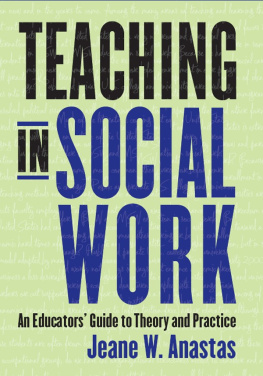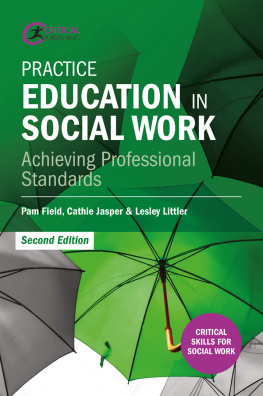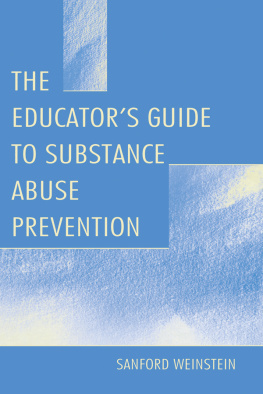TEACHING IN SOCIAL WORK
TEACHING IN SOCIAL WORK
AN EDUCATORS GUIDE TO THEORY AND PRACTICE
Jeane W. Anastas
COLUMBIA UNIVERSITY PRESS NEW YORK
COLUMBIA UNIVERSITY PRESS
Publishers Since 1893
New York Chichester, West Sussex
cup.columbia.edu
Copyright 2010 Columbia University Press
All rights reserved
E-ISBN 978-0-231-52093-5
Library of Congress Cataloging-in-Publication Data
Anastas, Jeane W.
Teaching in social work : an educators guide to theory and practice /
Jeane W. Anastas
p. cm.
Includes bibliographical references and index.
ISBN 978-0-231-11524-7 (cloth : alk. paper)
ISBN 978-0-231-11525-4 (pbk. : alk. paper)
ISBN 978-0-231-52093-5 (e-book)
1. Social work education. I. Title.
HV11.A56 2010
361.3071dc22
2009041189
A Columbia University Press E-book.
CUP would be pleased to hear about your reading experience with this e-book at .
References to Internet Web sites (URLs) were accurate at the time of writing. Neither the author nor Columbia University Press is responsible for URLs that may have expired or changed since the manuscript was prepared.
This book is dedicated to a gifted teacher and a lifelong friend, Jennifer Rochow, who first introduced me to the literature on teaching and learning in higher education from which I have learned so much. I make this dedication with thanks for the inspiration I have drawn from her life and work and for the loving support she has provided in all aspects of mine.
CONTENTS
5. Field Education in Social Work:
Teaching Roles amid Old and New Challenges
K. Jean Peterson
6. Technology in Social Work Education
James W. Drisko
YEARS AGO, THE LATE John Michel, a senior editor at Columbia University Press, encouraged me to develop a proposal for a book like this one. John was not only my editor; he was an intelligent, discerning, witty, and always encouraging friend. Sadly, I did not fully realize until after his passing the scope and value of his gifts to me over the years. I thank him for his role in the genesis of this work, and I hope I honor his memory by bringing this project to a conclusion.
Also important to the origin of this book have been the scores of doctoral students I have had the privilege of teaching about teaching in two different doctoral programs in social work, Smith Colleges School for Social Work and New York Universitys Silver School of Social Work. What I have learned from these experienced and successful learners who are or are aspiring to be teachers has been immeasurable. The doctoral students in these seminars provide new and useful insights every time I give the course, so I have been a learner as much as a teacher. Teaching about teaching is not easy. In addition, I know that my students are observing what I do, and I am humbled at how often I have to fall back on the motto of the hypocrite and the error prone: Do as I say, not as I do. I thank all these studentspast, present, and futurefor how much they have contributed, often unwittingly, to my own teaching and the thinking that informs this book.
A few other people deserve special mention and thanks. Over the years, Dr. Starr Wood has read and commented helpfully on parts of this manuscript. When I came to New York University in late 1999, my colleagues Dr. Gary Holden and Dean Emeritus Thomas Meenaghan generously included me in their research on educational outcomes in the MSW program, a very valuable opportunity for me. Dean Suzanne England, a great supporter of the scholarship of teaching and learning, authorized a sabbatical leave for me in 2006/2007, much of which I spent working on this manuscript. Matt McGuirk, who works in information technology at the Silver School, generously helped in the final preparation of the illustration that presents the books conceptual framework. Anonymous reviewers provided by Columbia University Press both at the prospectus stage and for the completed manuscript provided valuable feedback that has improved the final product. Now it is Lauren Dockett at Columbia University Press who has provided the patience and encouragement that enabled me to complete this long-term project. While all these people have contributed much, the flaws and limitations of this work cannot be attributed to anyone but me.
Finally, I thank my life partner and now spouse, Janice Gibeau, for her encouragement and forbearance during this long, drawn-out project. At the very least, she has endured too many hours of, as she would say, looking at the back of my head. My gratitude for her enduring love and support is beyond measure.
JUST AS SOCIAL WORK EDUCATION has been growing in recent years, so has our knowledge about teaching effectively. In 2007, the Council on Social Work Education (CSWE) counted more than 180 accredited masters programs and more than 450 accredited baccalaureate programs in the United States, with more being developed (CSWE 2007b). Total student enrollment in these programs was estimated at about 32,000 in baccalaureate programs and 39,000 in masters programs in 2006/2007, all the students learning in either the classroom and/or the field. The Council on Social Work Education estimated that there were more than 8,000 faculty members in social work schools and departments in 2006/2007, 74 percent of them full time. These teachers and these learners are part of a profession that is predicted to grow in the coming years, in an increasingly multicultural society. These teachers and learners share the conviction that their clients need and deserve the services of social workers who are well prepared for this varied, complex, and demanding work.
In higher education generally, knowledge about how to teach effectively is expanding rapidly and is growing in sophistication. Social work educators traditionally have used a range of teaching methods. But even though many doctoral graduates in social work become full-time faculty in social work, only about one-third (Valentine et al. 1998) to one-half (Hesselbrock 2006) of social work doctoral programs require or make available courses on teaching. Because many doctoral students in social work decide to obtain a doctorate in order to enter academia, many would like better or more systematic preparation for teaching.
This book links the practice wisdom of todays social work educators with current theories and knowledge about students learning and effective teaching methods. It is designed for newcomers to teaching in social work, for those who want to refresh their approach to their work, and for those in social work doctoral programs and educational administration to enhance their students education.
This book, which grew out of teaching aspiring social work educators, summarizes the existing literature on teaching and learning in social work. It also draws selectively on the literature in the field of higher education more generally to show how teaching can be applied to social work education specifically. However, the literature on teaching in higher education is typically addressed to teaching in the academic disciplines, and not to the professions. Thus, we must consider how this knowledge can best be applied to social work education, whose goal of nurturing student growth must be combined with ensuring that graduates will be effective and ethical service providers. In some ways, I have tried to write the book I wished I had when I began to teach the teachers.
The framework I am using could be characterized as a person-in-environment perspective. Davis (1993), for example, described those factors that affect teaching and learning: the










